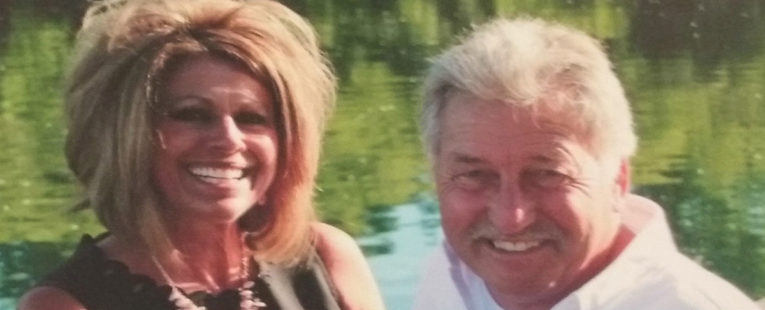After retiring from Caterpillar Inc., Leslie and Pat Aten of Groveland, Illinois, were looking forward to a future of spending time with their children and grandchildren at their cabin at Giant Goose Ranch in Canton.
But in April 2016, just a year after Pat’s retirement, he was diagnosed with prostate cancer. It was very advanced, Leslie said, so the couple decided to seek treatment at the Mayo Clinic where Pat had his prostate removed.
Three weeks after the surgery, Pat was doing well and the couple thought the worst was behind them.
But Leslie began noticing things. She’d leave the house and come home and the water in the kitchen would be running or all the cabinets would be open. One day she heard Pat in the other room dragging his leg. There were times of forgetfulness and personality changes.
“These things would happen, and then he’d be perfectly fine the next day and back to being the old Pat,” Leslie said. “I thought at first he’d had a stroke or it was the beginning of Alzheimer’s.”
A new diagnosis
It was Memorial Day 2016, and Leslie had already told the couple’s children she suspected something was wrong with Pat. The couple was spending the holiday at the cabin and Pat fell on the steps leading to the boat dock. Leslie took him to the emergency room at OSF HealthCare Saint Francis Medical Center where an MRI showed a large tumor on his brain.
Pat was diagnosed with glioblastoma (GBM) – the same brain cancer that recently claimed the lives of Sen. John McCain and Beau Biden, the son of former vice president Joe Biden.
“GBMs are graded from 1 to 4. Pat’s was a grade 4. It’s a terminal cancer – they tell you that from the get go,” Leslie said.
On June 2, 2016, just six weeks after his prostate surgery, Pat underwent a craniotomy by Dr. Andrew Tsung with OSF HealthCare Illinois Neurological Institute to remove as much of the large tumor as possible. Leslie said GBMs are not surgically curable and the tumor grows back. Pat’s treatment also included radiation and pill-form chemotherapy.
A return of the tumor
In October 2016, a follow-up MRI showed the tumor was back and bigger than before, Leslie said.
“We had the option of another craniotomy, but he wouldn’t be able to have radiation. Pat said, ‘no’ to another operation,” Leslie said.
Beginning care with OSF Hospice
The decision was made to begin hospice care at home with OSF Hospice. A nurse made weekly visits to check on Pat’s vitals and oversee his medication.
By November, Pat was on oxygen and had a lot of swelling due to the removal of lymph nodes during his prostate surgery. By December, Pat’s condition had really declined.
In January 2017, Pat felt he was having a heart attack. Leslie called hospice and was instructed on the medication to give him. At this point, Leslie knew she needed to better equip the couple’s home for Pat’s comfort.
Under home hospice, families are allowed respite time at the OSF Richard L. Owens Hospice Home in Peoria. Leslie and Pat decided to go to the home “so I could get the home better equipped – get a hospital bed, a lift chair …,” Leslie said.
“He loved it out there,” Leslie said. “Pat didn’t want to die at home.”
Finding comfort
Pat returned home for about four weeks. OSF Hospice continued to care for him in the home with regular visits from a nurse and other support twice a week to assist him with showers. By Valentine’s Day, Pat wanted to return to the hospice home.
“They have everything you need out there. They have great care. The doctors are there to see you 24/7,” Leslie said.
Pat spent his last four months at the hospice home. He died at the age of 67 on June 14, 2017, one year and 12 days from the glioblastoma diagnosis.
“It was a wonderful, wonderful place,” Leslie said. “We stayed until the end. That was his wish.”
Her appreciation for the caregivers at the hospice home is immeasurable.
“They took care of my loved one, I could never thank them enough for what they did,” she said. “They prayed with you, they prayed with him. They not only took great care of him, they took care of me and embraced our whole family.”
Supporting research
Leslie has become a supporter of causes that raise money for brain cancer research.
Specifically, she supports the annual Mark Linder Walk for the Mind. The 16th annual event takes place Saturday, September 29, 2018, at the Peoria RiverPlex. The first walk was held in 2003 when Mark created it due to his experience of feeling alone when he was diagnosed with a brain tumor.
His mission was to create brain tumor awareness in the local community. Mark also wanted to raise funds for brain tumor research.
Mark lost his battle in 2005 at the age of 31 but not before he got to see his vision making a difference. Re-named after his death, the Mark Linder Walk for the Mind now attracts over 800 participants from all over Central Illinois.
A check for $80,000 was presented in 2017 to the University of Illinois College of Medicine Peoria for its Brain Tumor Research Program. For the seventh year, all net proceeds will again be donated to that research.
Click here to register for the Mark Linder Walk for the Mind.
Last Updated: April 22, 2022
